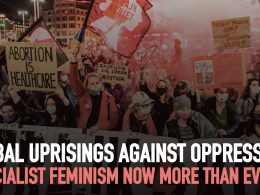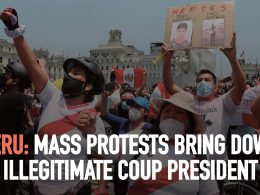Statement by Socialist Alternative–our sister organisation in England, Wales and Scotland
For the last six months, the government and Johnson have been rocked by revelations as part of the ‘partygate’ scandal, with a barrage of examples of top-level ministers breaking their own Covid guidance to host a series of parties in Downing Street. With the release of the latest report by senior civil servant Sue Gray, more details of these parties have been exposed.
A damning account
In many ways, the report confirms what everyone knew to be the case: that the Tory government flagrantly broke the law and lied about it, while the rest of us dealt with lockdown conditions, isolated from friends and family, and in many cases working despite the threat of the pandemic. But now the extent of the party culture that existed has been revealed. Top government officials were up all night drinking to the point where “one individual was sick” and there was “minor altercation between two individuals” at 10 Downing Street.
This is unacceptable behaviour in the workplace at the best of times, but especially objectionable during a public health crisis, when gatherings of more than two people indoors was a punishable offence. It is clear in the report that the Tories thought they could cover up this behaviour and get away with it. It was only following mass pressure that this investigation was even launched. As of today, Boris Johnson, who the report points out was present for a number of these illegal gatherings, has shockingly only received one fine as of its publishing.
This report is a major embarrassment for not only Johnson but the whole government. Sue Gray herself points the finger at “the senior leadership at the centre, both political and official” who bear the responsibility for organising these gatherings.
This party culture was coupled with contemptuous attitude toward workers in No.10, including a “lack of respect and poor treatment of security and cleaning staff”. Staff also reported that they had “witnessed or been subjected to behaviours at work which they had felt concerned about but at times felt unable to raise properly.” This behaviour — utterly characteristic as it is — demonstrates the attitude of this government in full detail.
With the then-new outbreak of war in Ukraine earlier this year, there was a concerted attempt from government officials to shift the narrative away from this scandal, to say that things have “moved on”. But as of May, the government has no such diversion to hide behind. This time the emperor truly has no clothes.
Will this be the end of Johnson?
Instead, we see the reality of Boris Johnson’s government: one defined by corruption, presiding over a cost of living disaster, and one that has all but completely lost the confidence of the majority of working class people in Britain. Even in polls before this report, public support for Johnson was catastrophically low. The question will be raised about whether Johnson can continue to stagger on after all this.
Already, some Tory backbenchers have indicated that they will submit letters of no-confidence in Johnson, and we may well see an attempt to unseat him from the ranks of his own party. But the Prime Minister’s aim will be to try to ride out this storm as he has throughout the stream of scandals and crises that have marked his entire tenure in power.
As it stands, nobody appears poised to immediately take over Johnson’s position, and as Britain heads toward yet another economic crisis, it is unlikely that any potential challengers will be feeling particularly confident about taking the reins either.
Rishi Sunak for instance, once seen by commentators as Johnson’s most likely successor, has undergone a dramatic fall from grace in recent months, following revelations about his wife’s non-dom [off-shore] tax status, his own implication in partygate, and as the face of the government’s refusal to take decisive action to address rising living costs.
Meanwhile Starmer’s Labour Party, as shown in local elections, has been unable to make serious gains out of this crisis. Despite the anger that exists, Labour is not seen as any more capable or trustworthy in the eyes of the vast majority.
The widespread anger at the Tory government is only bound to increase, but as much as people want to see Johnson out, the route toward this seems unlikely to come from those currently sitting in parliament. Socialist Alternative stands for the building of a new left party for workers and youth, to be built from the struggles of working class people and all the oppressed. This could be a party run by and for working class people, with all elected officials subject to democratic recall to be held accountable, and accepting an average workers wage.
Build for 18 June TUC protest in London
We need to build a struggle ourselves, in the streets, on campuses, in the workplace and in our local communities to force Johnson and his government out, and to replace the whole capitalist system they stand by. Not only is it a system clearly rotten to the core with corruption, but at the same time, is failing to even deliver on basic needs such as food and fuel.
The protest called by the TUC on 18 June must be an enormous mobilisation against the Tories and the cost of living crisis — and used as a launchpad for wide-scale and coordinated industrial action. This could draw together the struggles already being prepared in trade unions such as the RMT rail workers union and postal workers in the CWU who are preparing for important strike action, as well as the struggles of other sections of workers and young people, to win higher pay, an end to rising prices and drive the Tories from office.












